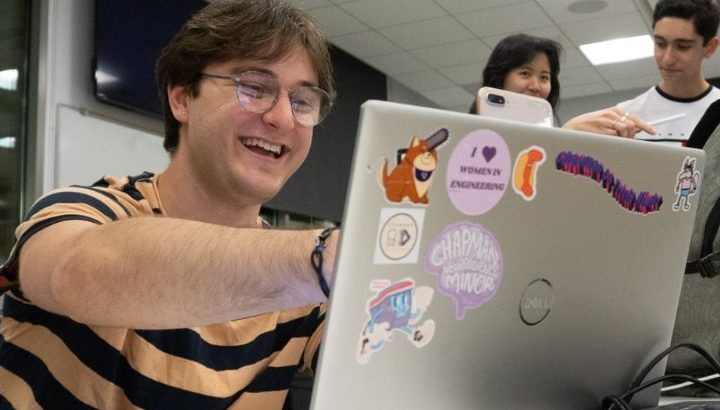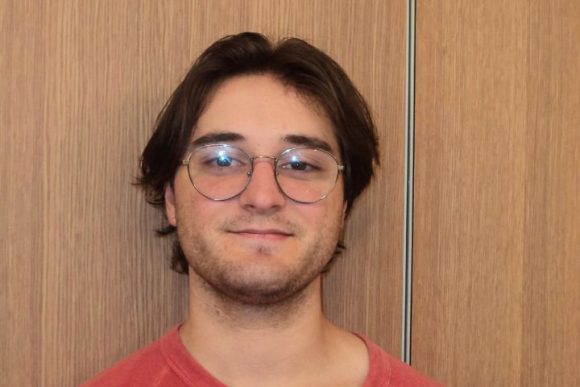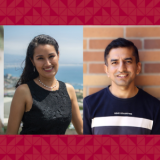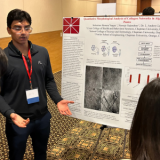
Chapman’s Computer Science Club President, Ben Fellows, and his Journey from Transfer Student to Security Consultant “I apply stuff that I learned in the Information Security and Policy (ISP) classes to what I'm doing currently." - Ben Fellows '24
April 1, 2024
Name: Ben Fellows
Major: B.S. Computer Science ‘24
Minor: Information Security and Policy (ISP)
Extracurricular Involvements: Chapman Computer Science Club President
Career Outlook: Security Consultant at Destra Multifamily, former Software Engineer Intern at Briq

Ben Fellows, Computer Science Club President and current Security Consultant for Destra Multifamily
Ben Fellows (Computer Science ‘24) transferred from Santa Barbara City College to Chapman University in 2021. Initially, Fellows declared his major in psychology. However, he discovered his passion for computer science after taking a few engineering classes. “I took an Intro to Computer Science class with Murphy Studebaker as a GE and really liked it. I took her 231 class, and then I switched my major to computer science and met many really cool people in computer science,” he said, “now I’m here.”
Through classes such as Studebaker’s 230 class, Fellows connected with other students and recognized his interest in cyber security. As a transfer student, Fellows emphasized how his initial experiences motivated him to get more involved on campus to make more connections outside his classes.
“I think that not having a traditional orientation and being transferred in without a major initially made it so that I had to find my own way into connecting with people. I had to find my place in Comp Sci, and these interpersonal skills that I developed are what led me to where I am now,” he said.
Now serving as the Computer Science (CS) Club’s President, Fellows has made an incredible impact on the Fowler Engineering community and has contributed to the growth of the CS Club. Besides being one of its very first founding members, Fellows has advocated for the Club’s presence and has worked towards continuing to make it a more inclusive environment for all students, regardless of skill level or background.
Fellows found a welcoming environment in Swenson Hall and within the Fowler Engineering community. “It became clear to me that I wanted to foster as many of these connections as possible, as I found a place that I felt I fit in with and could be myself.”
Discovering a Curiosity in Cybersecurity
While his interest in Computer Science led him to change majors, Fellows discovered a particular interest in cybersecurity. Fellows connected with faculty members who shared their industry knowledge inside the classroom, and he attributes his skills to some of them.
Justin Kaneshiro, who taught Intro to Cybersecurity, fostered his enthusiasm for the field, and Ryan Bakonis taught one of his favorite classes, Digital Forensics, through elaborate labs and field trips that align with FSE’s initiative for a hands-on curriculum.
Additionally, “Laz has been a great resource and mentor for me and many others in the minor,” he said, “offering personal and professional advice, as well as plenty of industry connections.”
Fellows aimed to tie those lessons from the classroom to his career.
“I apply stuff that I learned in the Information Security and Policy (ISP) classes to what I’m doing currently. I also use the communication skills I’ve gained from CS Club, and without CS Club and my time here at Fowler, I probably wouldn’t have made the connections,” he said.
Opportunity Calls
As Fellows grew his skills in cyber security, he secured an internship with Briq as a Software Engineer. After completing his internship, Fellows continued to pursue other opportunities to hone his computer science skills. He said, “I met someone at a networking event off campus. At the time, the company had less than ten people, and they didn’t have anyone doing security work, so they sent me an email asking about working on an incident.”
Recognizing his potential, Destra Multifamily, a real estate investment sponsor start-up, contacted Fellows and extended an opportunity to work for them. “I got back really quick and hopped in a call. After that initial assessment I did for them, they figured out how someone got access to their account and I tightened things up a bit. They asked, ‘Can we keep you on to do some IT and security?’ And that’s how it came to be,” Fellows said.
Now, Fellows serves as a Security Consultant for Destra Multifamily, assisting the company in basic security configuration and systems monitoring. He said, “I onboard all their systems into an employee manager and ensure they’re not downloading malware. In the meantime, while I’m monitoring and not really actively doing anything on the security end, I take items off their IT checklist.”
Additionally, Fellows has set up the company’s Microsoft Suite. “I’m setting up email filters and messing with the mailboxes and Outlook, doing their SharePoint, Viva Topics, and whatnot,” he said.
Paying it Forward: Advice for Engineering Students
Fellows hopes his Security Consultant position will help him solidify his chances in the long run when applying for a permanent position. Acknowledging the competitive nature of today’s job market, Fellows has worked diligently to ensure he makes the most out of his current position.
“It’s really hard to get entry-level positions in cyber security. No one’s just getting hired as a security analyst or any entry-level cyber security position without having adjacent experience or numerous certifications. So, I’m hoping that with this experience, I’ll be able to get an actual full-time entry-level position as a security analyst or consultant of some sort,” he said.
When asked about how students could improve their chances of securing similar positions, Fellows emphasized the importance of maintaining interpersonal communication skills.
“In cyber security or computer science in general, everyone nowadays has technical skills. I think what’s important to set yourself apart in the market is having those interpersonal skills and being committed to networking, doing the cold messages on LinkedIn, making those connections, and that sort of stuff,” he said.
On top of gaining interpersonal communication skills, Fellows also stressed the importance of having and pursuing a passion within the technical field.
“Having an idea of what you want to do makes you more marketable because you are passionate. You’re not just showing up to the interviews. You actually have something that is driving you. I think that’s a lot more appealing for employers,” he said.
How does he continue his job while juggling academics and the Computer Science Club? For Fellows, one of his primary sources of motivation are his supporters. “My main supporters are usually my friends, like people on the CS Club board and my close friends, and they’re really supportive,” he said.
Visit Fowler’s Careers and Internships website to access resources for finding your next internship or to schedule your next Career Advising appointment with Fowler’s Manager of Career Services, Sam Lee. For more information on how to get involved on campus, explore Chapman’s website regarding Clubs and Organizations.

